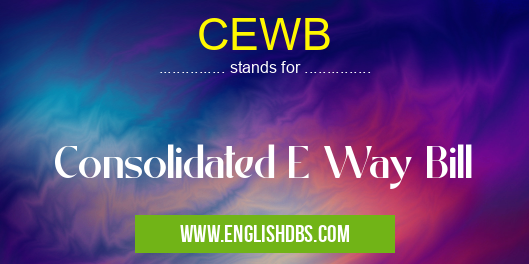What does CEWB mean in UNCLASSIFIED
CEWB stands for Consolidated e-Way Bill, also known as e-way bill grouping. It is a feature of the Goods and Services Tax (GST) system in India that allows the consolidation of multiple e-way bills into one document. This helps to streamline shipping processes, making it easier for businesses to distribute goods across the country without worrying about submitting individual bills for each shipment.

CEWB meaning in Unclassified in Miscellaneous
CEWB mostly used in an acronym Unclassified in Category Miscellaneous that means Consolidated E Way Bill
Shorthand: CEWB,
Full Form: Consolidated E Way Bill
For more information of "Consolidated E Way Bill", see the section below.
Explanation
Consolidated E Way Bills allow businesses to generate a single document which covers all their goods being transported at once, rather than having to submit multiple documents for each shipment. The process works by combining all the relevant information from multiple e-way bills into a single document. This creates an easy way to keep track of shipments with only one document that needs to be submitted to state tax officials. As a result, it reduces paperwork and simplifies shipping processes while ensuring compliance with GST regulations.
Benefits
The main benefit of using consolidated e-way bills is the increased efficiency it provides in managing the various elements of shipping goods across India. Instead of having to manually submit individual documents for each shipment, businesses can now generate one single consolidated document which covers them all. Consolidating paperwork into one document also reduces errors when preparing and submitting documents as manual data entry is eliminated from the process and accuracy is improved by automating integration with other systems such as inventory management or accounting software packages. Furthermore, this increases visibility into all shipments from point A to point B, allowing companies to better monitor their goods in transit and proactively manage delays or interruptions in service should they arise.
Essential Questions and Answers on Consolidated E Way Bill in "MISCELLANEOUS»UNFILED"
What is a Consolidated E Way Bill?
A consolidated E Way Bill or CEWB is an e-way bill that is created and generated for multiple consignments or shipments travelling in one vehicle from one place to another. It helps in the easy movement of goods without any intermission or interruption on the roads due to discrepancies in paperwork across states.
How does CEWB work?
A CEWB is generated using a single invoice or document, which details all of the goods being transported within one vehicle from one place to another. The transporter registers themselves on the portal and feeds in the invoice details such as transporter ID, the sender's GSTIN, Receiver's GSTIN and total number of packages etc. The portal then generates a unique CEWB number that serves as an e-way bill for all these transfers.
Is there any fee associated with CEWB?
No, there is no fee associated with generating and using a consolidated E Waybill. However, if you generate more than one consolidated E Waybill per month, then you will be charged extra according to your state's rules.
What are the benefits of using CEWB?
Using a consolidated E Waybill allows for smooth movement of goods without discrepancies in paperwork across states, resulting in reduced paperwork costs and faster delivery times. Additionally, it also reduces overall administrative cost by allowing for easier tracking between commodities and locations.
What documents do I need to generate my CEWB?
Generating a consolidated E-Way Bill requires basic information about your business such as GSTIN numbers of sender and receiver, shipment ID (if applicable), transporter ID (if applicable), total number of packages etc. You may also need other documents depending on your shipment type such as invoices etc.
Do I need to print out my CEWB?
Although not mandatory, it may be beneficial for you to print out your Consolidated E Way Bill before commencing transit as some instances may require it during transportation such as when entering certain check posts etc.
Is there any validity period for the Consolidated E Way Bills?
Yes, each Consolidated E Way Bill has a validity period based on its journey duration that cannot exceed 15 days from date of generation. This can be extended up to 30 days if required with prior permission from appropriate authorities if warranted by special circumstances during transit.
Final Words:
The introduction of CEWB has revolutionized how goods are handled throughout India's economy by providing an efficient way for businesses to track their shipments without having to worry about submitting lots of paperwork for every shipment. This has enabled greater transparency into the movement of goods across states and facilitated smoother operations between companies involved in transport management activities such as freight forwarding and logistics providers. CEWB provides a much needed solution which simplifies managing shipments while increasing compliance with GST regulations by submitting accurate information quickly and easily on one single document!
